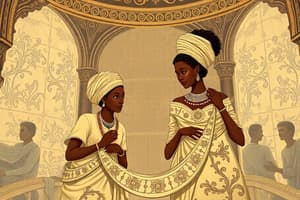Podcast
Questions and Answers
Which of the following was a primary economic activity in Nigeria during the precolonial period?
Which of the following was a primary economic activity in Nigeria during the precolonial period?
- Oil drilling
- Agriculture (correct)
- Mining of mineral resources
- Manufacturing of textiles
Which group was notable for establishing schools during the colonial period?
Which group was notable for establishing schools during the colonial period?
- Indigenous elders
- Missionaries (correct)
- European traders
- Local government leaders
What was a significant political structure in precolonial Nigeria?
What was a significant political structure in precolonial Nigeria?
- Colonial administration
- Federal government system
- Centralized monarchy
- Village democracies (correct)
What was a major factor in the rise of nationalism in Nigeria during the colonial period?
What was a major factor in the rise of nationalism in Nigeria during the colonial period?
When did Nigeria gain independence from British rule?
When did Nigeria gain independence from British rule?
What major conflict occurred in Nigeria from 1967 to 1970?
What major conflict occurred in Nigeria from 1967 to 1970?
What issue has continued to affect Nigeria following its return to democracy in 1999?
What issue has continued to affect Nigeria following its return to democracy in 1999?
Which of these problems has emerged as a significant issue for Nigeria in the 21st century?
Which of these problems has emerged as a significant issue for Nigeria in the 21st century?
Which military leader was known for ruling Nigeria with an iron fist?
Which military leader was known for ruling Nigeria with an iron fist?
What movement emerged in Nigeria to address police brutality and political corruption?
What movement emerged in Nigeria to address police brutality and political corruption?
Flashcards are hidden until you start studying
Study Notes
Precolonial Period
- Cultural Diversity: Nigeria has over 250 ethnic groups, including the Hausa, Yoruba, and Igbo.
- Political Systems: Varied from kingdoms (e.g., Oyo Empire, Benin Kingdom) to village democracies.
- Economy: Primarily agriculture-based; trade networks were established, especially in trans-Saharan trade.
- Religion: Indigenous beliefs were dominant, alongside early influences of Islam in the north and Christianity from European traders.
Colonial Period (1861 - 1960)
- British Colonization: The British established control through treaties, military conquests, and the amalgamation of the Northern and Southern Protectorates in 1914.
- Exploitation of Resources: Nigeria's rich resources, like palm oil, cocoa, and later oil, were exploited for British economic gain.
- Education and Christianity: Missionaries established schools; education began to spread, leading to a new educated elite.
- Nationalism and Resistance: Growing dissatisfaction with colonial rule led to the rise of nationalist movements, notably the Nigerian National Democratic Party.
Postcolonial Period (1960 - Present)
- Independence: Nigeria gained independence on October 1, 1960, with Nnamdi Azikiwe as the first president.
- Civil War (1967-1970): The Biafran War resulted from ethnic tensions and economic disparities; led to significant loss of life and humanitarian crises.
- Military Rule: Multiple coups led to military dominance in politics, with leaders like General Sani Abacha ruling with an iron fist.
- Democracy Restoration (1999): Transition to civilian rule led to the election of Olusegun Obasanjo; marked ongoing democratic governance challenges.
- Current Issues: Ethnic tensions, Boko Haram insurgency, economic diversifications, and oil dependency remain key affairs.
- Recent Developments: Political instability, corruption, economic reforms, and youth activism through movements like #EndSARS against police brutality.
Precolonial Nigeria
- Diverse Cultures: Over 250 ethnic groups, including the Hausa, Yoruba, and Igbo, called Nigeria home, each with unique traditions and languages.
- Varying Political Structures: Ranged from powerful kingdoms, like the Oyo Empire and Benin Kingdom, to smaller village-based democratic societies.
- Agricultural Economy: The backbone of the precolonial economy, with trade networks connecting communities and furthering economic ties, especially in trans-Saharan trade.
- Indigenous Religions: Predominant in the precolonial era, alongside early influences of Islam in the north and Christianity introduced by European traders.
Colonial Nigeria
- British Conquest: British dominance was established through treaties, military conflicts, and the merging of the Northern and Southern Protectorates in 1914, creating "Nigeria" as we know it today.
- Resource Exploitation: Nigeria's wealth, including palm oil, cocoa, and later oil, fueled British economic growth while neglecting Nigerian prosperity.
- Education and Christianity: Missionaries brought education to Nigeria, laying the groundwork for the emergence of a new, educated, and increasingly politically aware elite.
- Nationalism and Resistance: Dissatisfaction with British rule fueled the rise of nationalist movements, culminating in the creation of the Nigerian National Democratic Party, a major catalyst for gaining independence.
Postcolonial Nigeria
- Independence Achieved: Nigeria gained independence on October 1, 1960, with Nnamdi Azikiwe as the first president, marking a significant shift in political power.
- Civil War: The Biafran War (1967-1970) was a consequence of ethnic and economic tensions, leading to devastating losses of life and lasting trauma.
- Military Dominance: Multiple coups in the early years of independence resulted in military rule, with leaders like General Sani Abacha holding significant power.
- Democracy Restored: A significant turning point occured in 1999, with the election of Olusegun Obasanjo signifying a return to civilian governance.
- Ongoing Challenges: Despite democratic efforts, Nigeria continues to struggle with ethnic tensions, the threat of Boko Haram insurgency, and the economic reliance on oil, highlighting the need for diversification.
- Recent Developments: Political instability, corruption, ongoing economic reforms, and youth activism through movements like #EndSARS highlight the current landscape, where calls for social justice and accountability are a major force.
Studying That Suits You
Use AI to generate personalized quizzes and flashcards to suit your learning preferences.




